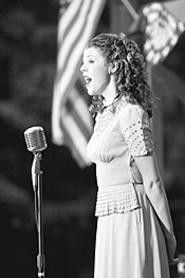But back in the '40s, nearly everyone was willing to do what they could to boost the spirit of the troops, so Rita Hayworth would show up at the Hollywood Canteen, publicist and photographer in tow, to dance with a bedazzled, fuzzy-cheeked GI. It's that blend of patriotic impulse and self-serving opportunism that drives the story behind the musical revue Swingtime Canteen, now playing at Stan Hywet Hall's lagoon stage.
This collection of evergreen tunes from that era ("I Don't Want to Walk Without You," "I'll Be Seeing You") will push the nostalgia buttons of those who were around at the time. So they'd probably be surprised to learn that this red, white, and blue show was co-written by one of America's leading drag performers and author of the campy off-Broadway cult favorites Vampire Lesbians of Sodom and Theodora, She-Bitch of Byzantium. Not only did Charles Busch help write the book for this show, he donned the gowns for the lead role of Marian Ames when it played in New York, lending his dry, female-impersonator's sarcasm to the part of a middle-aged film star whose career is, to put it delicately, in turnaround.
The conceit of the play is that Marian, after tanking in her last four flicks, has gathered an all-girl band -- including a couple of borderline musicians and her darling niece -- to entertain the grunts in London. Each of the women embodies a classic '40s archetype: Ingénue Katie is all starry-eyed and perky; tough broad Topeka, who pounds the piano, is a Rosie-the-Riveter type; Jo, a good-natured ditz, plays the trumpet and follows Marian everywhere (she's been her stand-in for 16 films); and sexy Lilly is a chorine looking for a good time.
While the book that ties these gals together is fairly minimal, there are several intriguingly bitchy lines, no doubt thanks to Busch. Marian, an inveterate name-dropper, recalls an observation directed toward her by Joan Crawford: "'Under those skirts, believe me, you've got 'em!' -- I assumed she meant my legs.")While that line is funnier delivered by a man in drag, it still gets a laugh, due to Susan Sanford's rueful and witty performance as Marian. Also, Sanford delivers one of the evening's highlights: a clear, heart-tugging rendition of "A Nightingale Sang in Berkeley Square."
Also excellent is Lisa Marie Schueller as leggy Lilly, the selfish dame who, true to the film genre being gently parodied, comes around in the end. She is especially effective in the spectacle-fogging Bobby Troup number "Daddy," during which she executes a couple of moves that would make any red-blooded young man in uniform . . . um, salute with vigor. Marissa Montigney is almost ridiculously cute as Marian's niece, Katie, and does a solid job on her solos.
In the more comical role of Topeka, Sarah Lyon hits all the notes, but misses some of the counterpoint in her character's rough-hewn persona. And she never quite gets control of the challenging song "His Rocking Horse Ran Away," not relishing the amusing narrative of a mom driven to distraction by her mischievous little boy. Beset by a clumsy hairdo, part ringlets and part hat-hair, Alana Rader has a couple nice bits as she tangles, verbally and with a few well-timed trumpet blasts, with Lilly. But Rader's singing flattens out too frequently, particularly on "Love Isn't Born, It's Made."
In any show with five female singers, you'd expect an Andrews Sisters moment, when some or all of the performers combine in close harmony to telling effect. There are opportunities for that here, but the group singing lacks the intricate harmonic blends that can make a tune such as "Apple Blossom Time" fully expressive. That's a disappointment, since, even though there are mini story lines (Katie's boyfriend is in the army, but she doesn't know where; Topeka's husband is at home with the kids), Canteen is really all about the songs.
Staged on Terry Burgler's cheerily star-swamped set, the show maintains a brisk and upbeat pace, thanks to director Nancy Cates. But there's an unavoidable downer when Katie reminds us that there are a lot of soldiers who don't return from war. That used to be a poignant reminiscence, but these days it's an inevitable, daily reality.


